 Petzlover
Petzlover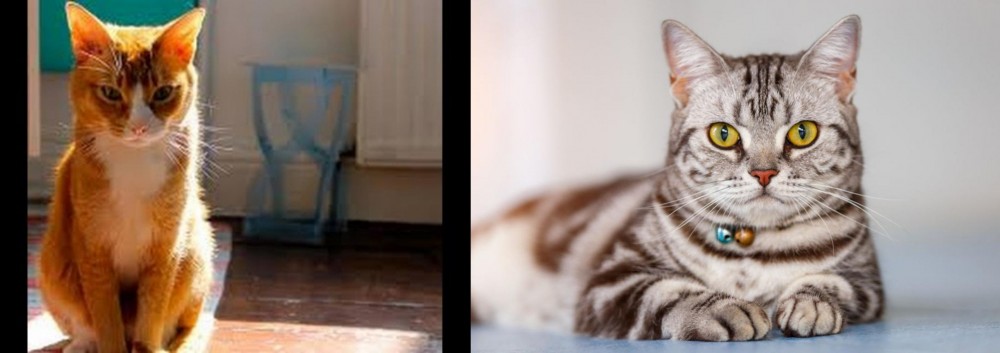 Chausie is originated from Egypt but American Shorthair is originated from United States. Both Chausie and American Shorthair are having almost same weight. Chausie may live 4 years less than American Shorthair. Both Chausie and American Shorthair has same litter size. Both Chausie and American Shorthair requires Low Maintenance.
Chausie is originated from Egypt but American Shorthair is originated from United States. Both Chausie and American Shorthair are having almost same weight. Chausie may live 4 years less than American Shorthair. Both Chausie and American Shorthair has same litter size. Both Chausie and American Shorthair requires Low Maintenance.
 The Afro-Chausie came about from breeding a few individuals from a species of jungle cat which was native to India, Asia and the Middle East. In other words, this is a cross between a wild cat and a domesticated cat.
The Afro-Chausie came about from breeding a few individuals from a species of jungle cat which was native to India, Asia and the Middle East. In other words, this is a cross between a wild cat and a domesticated cat.
It was only in 1995 that the Chausie was recognized as a domestic breed, and by the International Cat Association.
The Chausie breed essentially began in the 1990s, when breeders name the breed Chausie and also developed a breeding program. They received registration status in 1995. Chausies are bred in North America and Europe and in 2003 became a new breed in the United States.
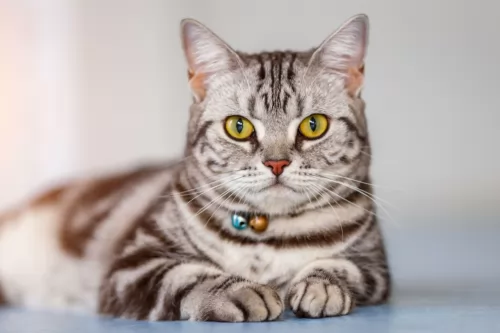 Often sailors of old would keep cats onboard to protect their stores from mice and rats, and so it was when settlers sailed from Europe to North America.
Often sailors of old would keep cats onboard to protect their stores from mice and rats, and so it was when settlers sailed from Europe to North America.
They had cats onboard and once onshore they interbred. But in the 20th century, a selective breeding program began to bring out the best qualities of these cats.
The American Shorthair is one of these cats – a pedigreed cat that is accepted by all North American cat registries. At first, the cat was known as the Domestic Shorthair but it was renamed in 1966.
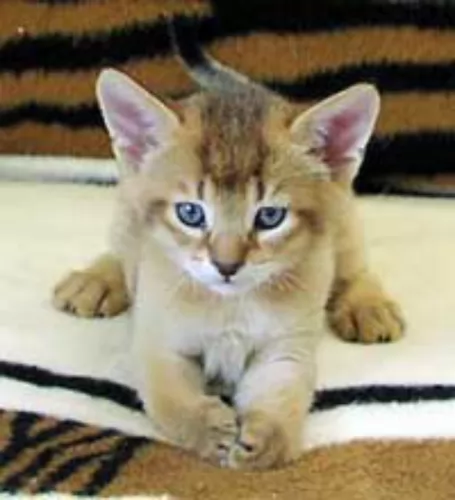 The Chausie is a medium to large cat with a long body and long legs. In fact, the hind legs are somewhat longer than their front legs, and they’re able to easily leap into the air and up onto high perches. Some people say these cats look like Pumas.
The Chausie is a medium to large cat with a long body and long legs. In fact, the hind legs are somewhat longer than their front legs, and they’re able to easily leap into the air and up onto high perches. Some people say these cats look like Pumas.
The adult Afro-Chausie can weigh between 5 to 9kg and they stand in height from 35cm to 45cm and sometimes taller, both male and female.
The ears of the cat are broad and tall and the almond-shaped eyes are a yellow to green shade. The TICA Chausie breed standard says that the cat comes in 3 colors – a black/brown ticked coats, solid black and black grizzled tabby, but in fact, they come in quite a few other colors and patterns too.
Your Afro-Chausie is an intelligent, loyal, social and athletic cat that is also playful. They love their human companions and will form a deep bond with them, making it difficult to rehome him later on.
They don’t like being alone, in fact to such an extent that they will befriend dogs in the home too. This is such an active cat and you can even train him to walk on a leash.
It’s a cat that also loves water and Similar to Bengals and Savannahs, this breed, too, enjoys water. This cat will form deep bonds with owners, hence rehoming has been known to be particularly challenging with this breed
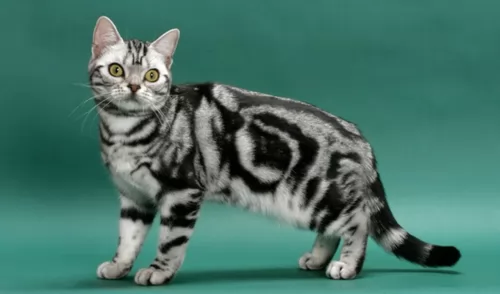 The American Shorthair is a large, sturdy cat with a round face and short ears. Their coats can come in many different patterns and colors. They shed so the fur will need to be brushed from time to time.
The American Shorthair is a large, sturdy cat with a round face and short ears. Their coats can come in many different patterns and colors. They shed so the fur will need to be brushed from time to time.
They stand at about 20 – 25cm in height and they weigh between 5 and 7kg.
The American Shorthairs are easy, no-fuss cats. They’re also low maintenance, healthy, amicable cats, ready to even be friends with strangers and your dogs.
He is an intelligent cat too so it will be important to provide him with toys that challenge him to think. These good-natured cats make perfect famiy companions.
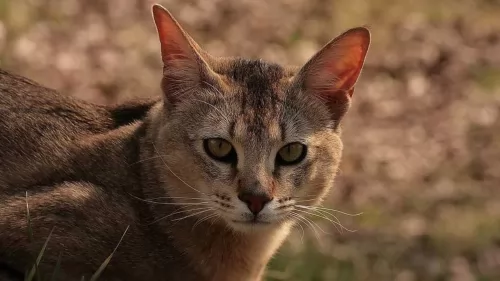 The Chausie loves human contact and they love games with their human family.
The Chausie loves human contact and they love games with their human family.
They’re intelligent and are constantly looking for things to do. They are athletic and have plenty of energy. They’re social, playful and make great playmates for children who have been taught to respect animals.
When you bring an Afro-Chausie into your home, you can expect to have a lot of action and entertainment with this beautiful cat.
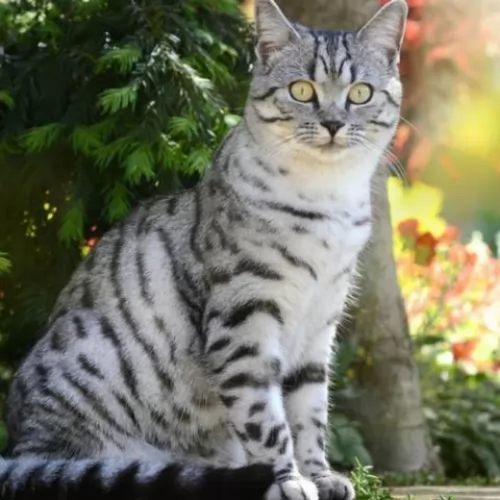 The American Shorthair is a playful cat and is quite capable of amusing himself, but will welcome your games too. He’s a big cat so make sure he gets enough exercise to avoid him becoming obese.
The American Shorthair is a playful cat and is quite capable of amusing himself, but will welcome your games too. He’s a big cat so make sure he gets enough exercise to avoid him becoming obese.
He is a low maintenance cat and you don't have to be worrying about him too much as he just likes to get on with life. He loves being well-fed, getting your attention and lying in the sun.
This is one cat that doesn’t need a lot of attention so being easy to care for, independent, playful, and affectionate, you’re going to have one of a kind companion and friend.
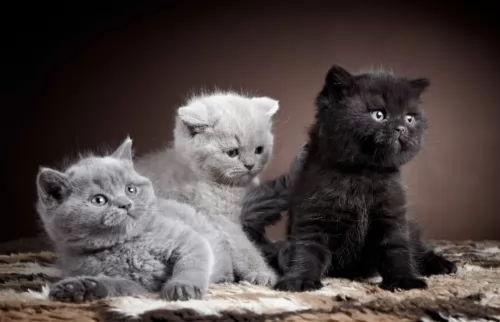 With good health, your Afro Chausie can live to be anything between 12 – 16 years of age. These cats are prone to developing food allergies, and this is why it is important to feed your Chausie high-quality food.
With good health, your Afro Chausie can live to be anything between 12 – 16 years of age. These cats are prone to developing food allergies, and this is why it is important to feed your Chausie high-quality food.
They’ve got fragile digestive systems and many are gluten intolerant.
All kinds of parasites can invade your Afro-Chausie’s body – internally and externally so be sure to have your Chausie checked over for parasites such as tick and fleas, worms and mites.
Check your Chausie for putting on too much weight as these cats have a huge appetite.
You just have to bear in mind that these cats can develop any of the illnesses that other domesticated cats get
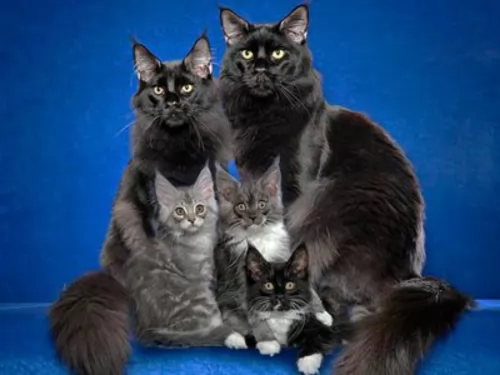 With their short coats, they only need to be brushed once a week as they are moderate shedders.
With their short coats, they only need to be brushed once a week as they are moderate shedders.
Provide your cat with a quiet place to sleep and which is comfortable and dry.
A cat tree can be useful for allowing your cat to climb and scratch.
Chausies are essentially meat-eaters. They don’t want to eat fruit and nuts. One of the Chausie’s ancestors was a wild cat and this is why they don’t eat the same foods as what your dog does.
Every cat thrives on a high-protein, low-carbohydrate diet. A dog’s diet with scraps from the table as well as human food can be fatal for your Chausie if it becomes your cat’s regular food.
He requires a diet of quality meat – beef, chicken, fish and organs – all foods that are easily digestible for your cat. Cats also need taurine from muscle meat such as shellfish and fish.
Always make sure your Chausie has access to a constant supply of fresh, cool water.
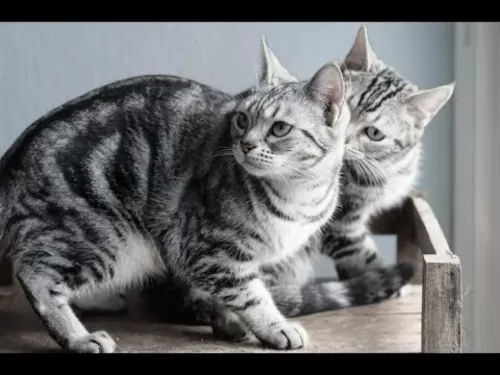 Your American Shorthair will benefit greatly from regular brushing and he looks forward to this grooming period and being pampered by you for a few minutes.
Your American Shorthair will benefit greatly from regular brushing and he looks forward to this grooming period and being pampered by you for a few minutes.
It helps to remove the dead hair from his coat and this is important so that he doesn’t ingest the loose hair. While you’re brushing him, you can also run your fingers over him to make sure there are no unusual lumps. Anything odd or any sign of illness you should take your cat to see the vet immediately.
Make sure your American Shorthair has access to the best quality food there is. There are many commercially manufactured cat foods available and your vet can advise you on the best one to choose.
Cats are carnivores so aways choose food that is high in proten. Food must be provided in accordance with the cat’s age and energy levels. Certainly a generic cat or one with a medical condition will need a certain type of food than a young, frisky kitten. Make sure your cat always has access to fresh, cool water.
Make sure your furry feline friend has everything he needs to ensure he is comfortable. This includes feeding bowls, toys, a litter box, soft bedding, nutritious food as well as scratching post and climbing equipment.
Have your pet neutered or spayed if you don’t want kittens from your cat. These procedures have enormous health benefits for your pet and it prevents even more kittens coming into a world that already has far too many unwanted pets.
Make sure your cat is up to date with all his vaccines because without being vaccinated your cat can succumb to any one of the life-threatening cat illnesses there are. Kittens need to have their first vaccines at 8 weeks of age.
If you have to take your cat to the vet you need a carrier basket so that your cat feels comfortable and safe inside it.
You can’t just put your cat on a leash and take him to the vet as inside the car he will lurch around and cause you to lose attention. A transport box that is familiar to your cat will be the best way for you and your cat to travel.